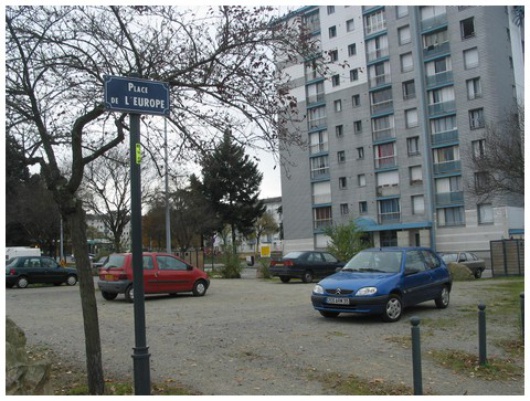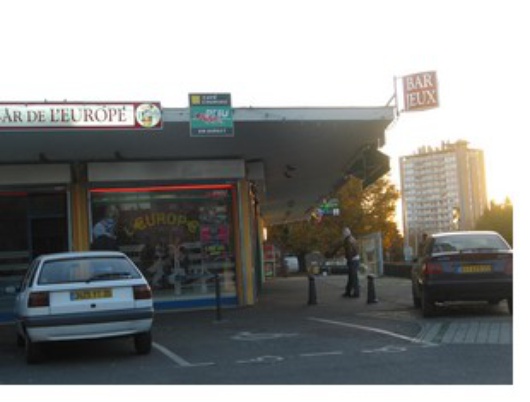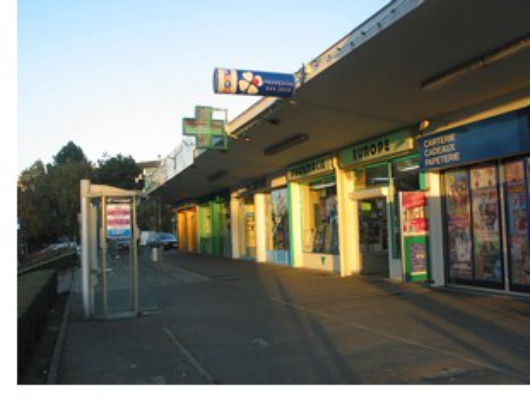Rennes: 'Helloo, immigrants'
Published on
Translation by:
 catherine e. moir
catherine e. moir
The scene is set: Place de l’Europe, shops, blocks of flats on the horizon and 'Le bar de l'Europe'. At the heart of this little tarmacked tower of babel, Europe is not the stuff of dreams
This is a problematic urban area, stuck between towering blocks of council flats and a noisy main street. The 'Place de l’Europe' in Rennes is little more than a car-park. At the tarmacked periphery of this neighbourhood, called 'Maurepas', all sorts of difficulties come together – council estates, a high level of unemployment, especially among the young, a majority of residents dependent on state welfare…
 A modest shopping complex there also bears the name of 'Europe'. Like all the nearby amenities in surrounding districts, it has a bar-cum-bookmaker (PMU), a bakery, a chemist, a taxi service, a hairdresser and an express supermarket. Little by little, the shopkeepers and merchants working here are leaving their dilapidated premises behind. The little grocery can not stand up to the onslaught of the large supermarkets. The town hall is trying to breathe some life back into this no man’s land by installing a local office there, to put the municipal services within the residents’ reach.
A modest shopping complex there also bears the name of 'Europe'. Like all the nearby amenities in surrounding districts, it has a bar-cum-bookmaker (PMU), a bakery, a chemist, a taxi service, a hairdresser and an express supermarket. Little by little, the shopkeepers and merchants working here are leaving their dilapidated premises behind. The little grocery can not stand up to the onslaught of the large supermarkets. The town hall is trying to breathe some life back into this no man’s land by installing a local office there, to put the municipal services within the residents’ reach.
Pub chat and the PMU
 Everybody seems to be jumping ship, but there is still life here. In the PMU you can find people, especially men, from different social classes. Young people, retired folk, the working class, second or third generation immigrants, and so on. The majority are gamblers and people from the neighbourhood who come here for pleasure: 'Because it’s a friendly place,' a regular confides. Behind the counter Sellam, of Moroccan origin, answers to a friendly nickname, 'camel', used by two of his clients who are apparently of French heritage going back several generations, while he himself replies, 'Hi, immigrants!'
Everybody seems to be jumping ship, but there is still life here. In the PMU you can find people, especially men, from different social classes. Young people, retired folk, the working class, second or third generation immigrants, and so on. The majority are gamblers and people from the neighbourhood who come here for pleasure: 'Because it’s a friendly place,' a regular confides. Behind the counter Sellam, of Moroccan origin, answers to a friendly nickname, 'camel', used by two of his clients who are apparently of French heritage going back several generations, while he himself replies, 'Hi, immigrants!'
In this social microcosm, all topics are discussed, and if Europe is ever brought up, everyone passes the buck. What is more, everyone thinks there is not much to say on the subject. 'The European Union is just about decisions taken in Brussels, in which we don’t have our ten pence to say,' someone says.
Conversation seems unanimous. Here, people feel first French, or identify with their city, Rennes, or their region, Brittany, before they feel European, and nobody attaches much meaning to the name 'Europe' on the street signs. It’s a word like any other, forgotten, deprived of any significance.
By contrast their 'Europe' goes back to 1960 when Maurepas’ tower blocks sprang up, to house workers coming from the countryside or neighbouring countries. There were many of them, so there was a rush to baptise the streets in this district that bore witness, ironically, to the formidable economic momentum of the post-war period. Moreover to give a nod, by way of the road signs, to the American generals who had liberated them, to local resistants, and to Rennes’ European twin towns.
The town council seems to want to make the district into a symbol of European renewal. Yet urbanism and history will triumph over this project: too few streets to name, and mistakes in the perception of the neighbourhood, and the Place de l’Europe quickly loses its solemn dimension. It retains the functional identity of a car-park at the foot of a tower block.
Over-complicated Europe
'We need Europe, it is even inevitable that we have it. In any case, we can’t go back now,' continue the regulars at the PMU in the Place de l’Europe, unenthusiastically. For them, Europe is above all an economic instrument, and not a political one. They believe in it, but criticise it for being too complicated. 'If one day Europe becomes more political, maybe I will be interested,' offers Didier, the local chemist of this little corner of Europe.
'It’s rubbish, we don’t have the same money, or the same language,' continues one of the bar’s clients. 'Europe could work, I am not against it, but we would need to harmonise our laws,' someone else adds. However, these citizens may be more European than they would like to believe. Gaëlle works in the local council office. She says, 'Here, it’s a bit like Babel.'
 The figures speak for this: 8% of the population of Maurepas is foreign, twice the average in Rennes. You only have to visit the office of the telephone and internet shop to hear immigrants keeping up to date with news of their relatives still living abroad. There aren’t many people of European origin here. Some are calling Spain or Portugal, or even Eastern European countries, but the majority of the clientele is of African origin, particularly from the Maghreb. Even in the shadow of sinister tower blocks, the Place de l’Europe has something of the famous Tower of Babel about it, where citizens of different cultures make a life for themselves here, with one another.
The figures speak for this: 8% of the population of Maurepas is foreign, twice the average in Rennes. You only have to visit the office of the telephone and internet shop to hear immigrants keeping up to date with news of their relatives still living abroad. There aren’t many people of European origin here. Some are calling Spain or Portugal, or even Eastern European countries, but the majority of the clientele is of African origin, particularly from the Maghreb. Even in the shadow of sinister tower blocks, the Place de l’Europe has something of the famous Tower of Babel about it, where citizens of different cultures make a life for themselves here, with one another.
All photos: (Élodie Auffray)
Translated from Sur le comptoir du bar de l'Europe


